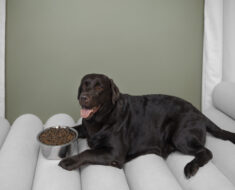Has your old dog developed a sudden and perplexing habit of urinating on your bed? It can be both puzzling and frustrating to witness this unexpected behavior.
However, rest assured that you’re not alone in facing this situation. In this article, we will explore the possible reasons behind your dog’s newfound inclination and provide you with valuable insights to help you unravel this mystery.
By understanding the underlying causes, you can take appropriate steps to address the issue and restore harmony in your home.
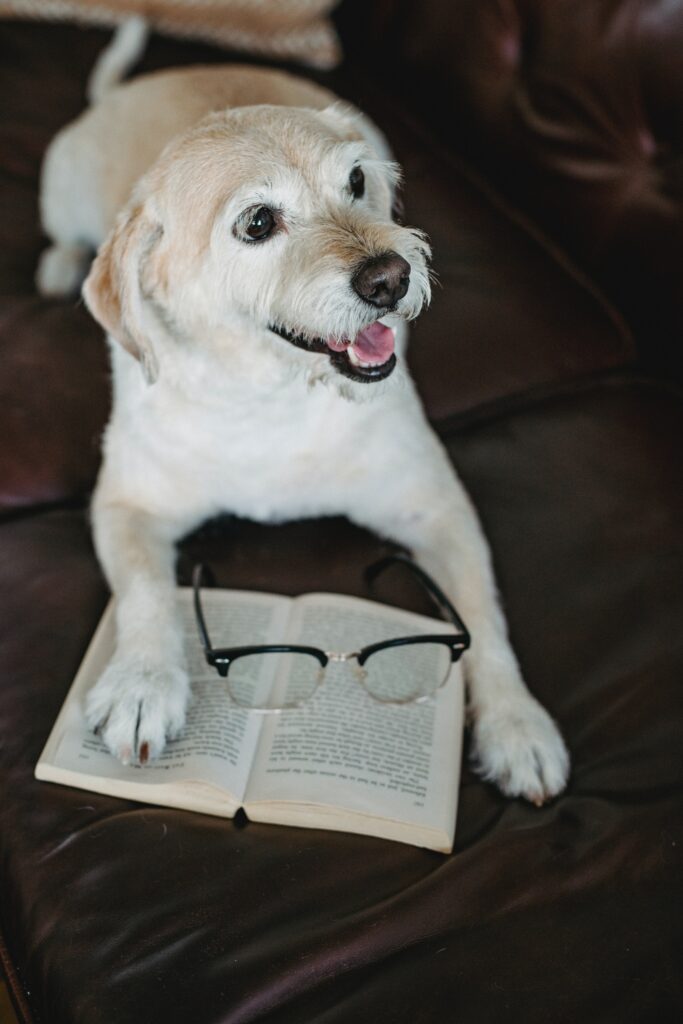
So, let’s delve into the intriguing world of canine behavior and discover why your old dog may be peeing on your bed all of a sudden.
Before that here check out why does a dog circle its bed before laying down.
What Is Incontinence In Dogs?
Incontinence in dogs refers to the inability to control urination. It is a common problem, particularly in older dogs, and can also occur in dogs of any age due to various medical conditions.
When a dog is incontinent, they may urinate involuntarily, leading to accidents in the house.
There are different types of incontinence in dogs, including:
1. Urinary sphincter incontinence:
This occurs when the muscles that control the flow of urine from the bladder become weak or relaxed. It is more common in spayed female dogs, but can also affect males. Dogs with urinary sphincter incontinence may dribble urine or have accidents while sleeping.
2. Overflow incontinence:
This happens when the bladder is unable to empty completely, causing it to overflow. It can be caused by a blockage, bladder muscle weakness, or nerve damage.
3. Behavioral incontinence:
Sometimes, dogs may urinate in the house due to behavioral issues, such as anxiety, marking territory, or lack of proper housetraining.
This is not true incontinence but can appear similar.
If you suspect your old dog is experiencing incontinence, it’s important to consult with a veterinarian. They can perform a thorough examination, run diagnostic tests, and determine the underlying cause of the incontinence.
Treatment options may include medication, dietary changes, hormone therapy, or surgery, depending on the specific diagnosis.
Remember, it’s essential to be patient and understanding with your dog during this time. Incontinence is a manageable condition, and with the right veterinary care and support, you can help your dog stay comfortable and reduce accidents in the house.
Here check out 54 inch dog bed.
Dogs Can Have Accidents on the Bed
Yes, dogs can have accidents on the bed. There are several reasons why a dog may urinate on the bed, including medical issues, behavioral problems, or a lack of proper housetraining.
Here take a look at some causes.
Causes Of Urinary Incontinence In Dogs
Age:
Age-related factors can contribute to a dog suddenly peeing on the bed. As dogs get older, they may experience a decline in bladder control due to muscle weakness or loss of elasticity in the urinary sphincter.
This condition, known as urinary incontinence, can lead to accidents, including urinating on the bed.
Aging can also bring about cognitive changes, such as confusion or forgetfulness, which may result in the dog not recognizing the appropriate place to eliminate.
Consulting a veterinarian can help determine if age-related factors are contributing to the behavior and guide appropriate management strategies.
Medical problem:
A sudden onset of a dog peeing on the bed can be indicative of an underlying medical problem. Several medical conditions can cause increased urination or loss of bladder control in dogs.
These may include urinary tract infections, bladder stones, diabetes, kidney disease, or hormonal imbalances. It is important to consult with a veterinarian to conduct a thorough examination, perform necessary tests, and identify any underlying medical issues.
Treatment can then be tailored accordingly to address the specific medical problem and help resolve the inappropriate urination behavior.
Urinary Tract Infections
Urinary tract or kidney problems can be a possible cause for an old dog suddenly peeing on the bed.
Issues such as urinary tract infections, bladder stones, kidney disease, or urinary incontinence can lead to increased urgency or frequency of urination, resulting in accidents on the bed.
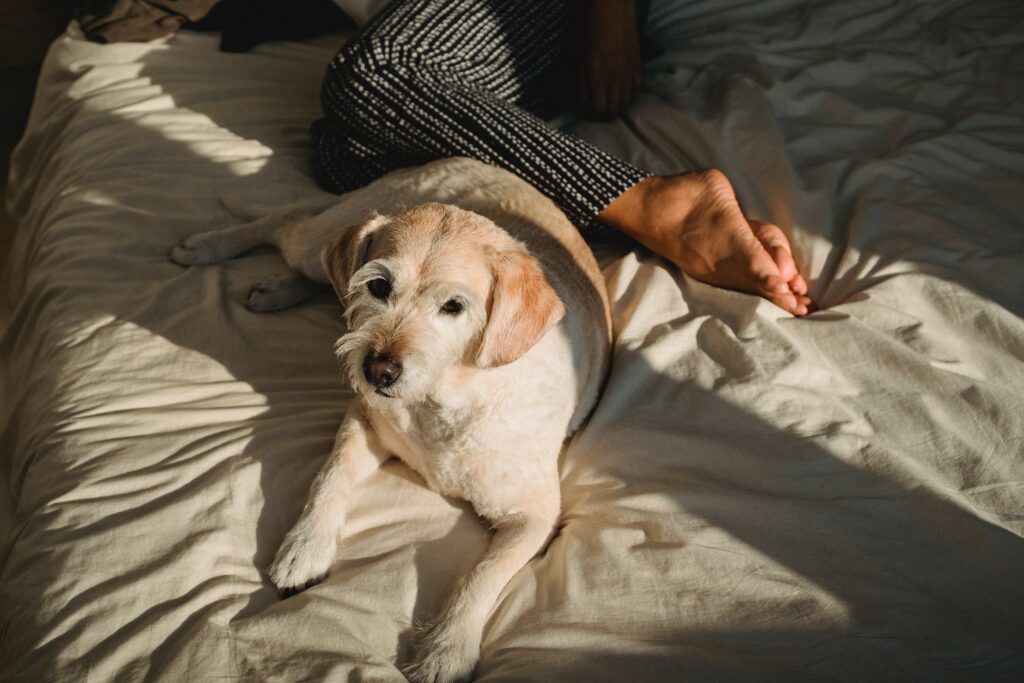
These conditions can cause discomfort or hinder the dog’s ability to control their bladder properly.
Consulting a veterinarian is essential for a thorough examination, diagnostic tests, and appropriate treatment to address the specific urinary tract or kidney problem and help resolve the urination issue.
Cushing’s Disease
Cushing’s disease, also known as hyperadrenocorticism, can be a possible cause for an old dog suddenly peeing on the bed.
It is a condition characterized by excessive production of cortisol, a stress hormone, by the adrenal glands. Increased cortisol levels can lead to increased water consumption and subsequently more frequent urination.
The dog may have difficulty controlling their bladder or experience accidents on the bed. Diagnosis involves veterinary examination, blood tests, and possibly imaging.
Treatment options may include medication or surgery, depending on the underlying cause. Consulting a veterinarian is crucial for proper diagnosis and management of Cushing’s disease and its associated urination issues. Here you can check out why your dog like to go under bed.
Diabetes
Diabetes can be a potential cause for an old dog suddenly peeing on the bed. Diabetes mellitus is a metabolic disorder that affects the regulation of blood sugar levels.
When a dog has diabetes, their body may not produce enough insulin or cannot effectively use insulin, leading to increased blood glucose levels.
One of the common symptoms of diabetes is increased thirst and frequent urination. If a dog has uncontrolled diabetes, they may urinate more frequently, including on the bed.
Consulting a veterinarian is essential for diagnosis through blood tests and implementing appropriate management, which may include insulin therapy and dietary changes, to control the diabetes and address the urination issue.
Cognitive Dysfunction
Cognitive dysfunction, also known as canine cognitive dysfunction (CCD) or doggy dementia, can be a potential cause for an old dog suddenly peeing on the bed. CCD is a condition similar to Alzheimer’s disease in humans and can affect older dogs.
Dogs with CCD may experience confusion, disorientation, and changes in behavior, including forgetting their housetraining.
They may lose the ability to recognize appropriate elimination spots, leading to accidents on the bed.
Consulting a veterinarian is important to evaluate the dog’s symptoms and provide appropriate management strategies to support their cognitive function and manage the urination issue.
Old Age
Old age can be a contributing factor for an old dog suddenly peeing on the bed. As dogs get older, they may experience a decline in muscle tone and bladder control.
This can lead to urinary incontinence, where the dog is unable to fully control their bladder and may have accidents, including on the bed.
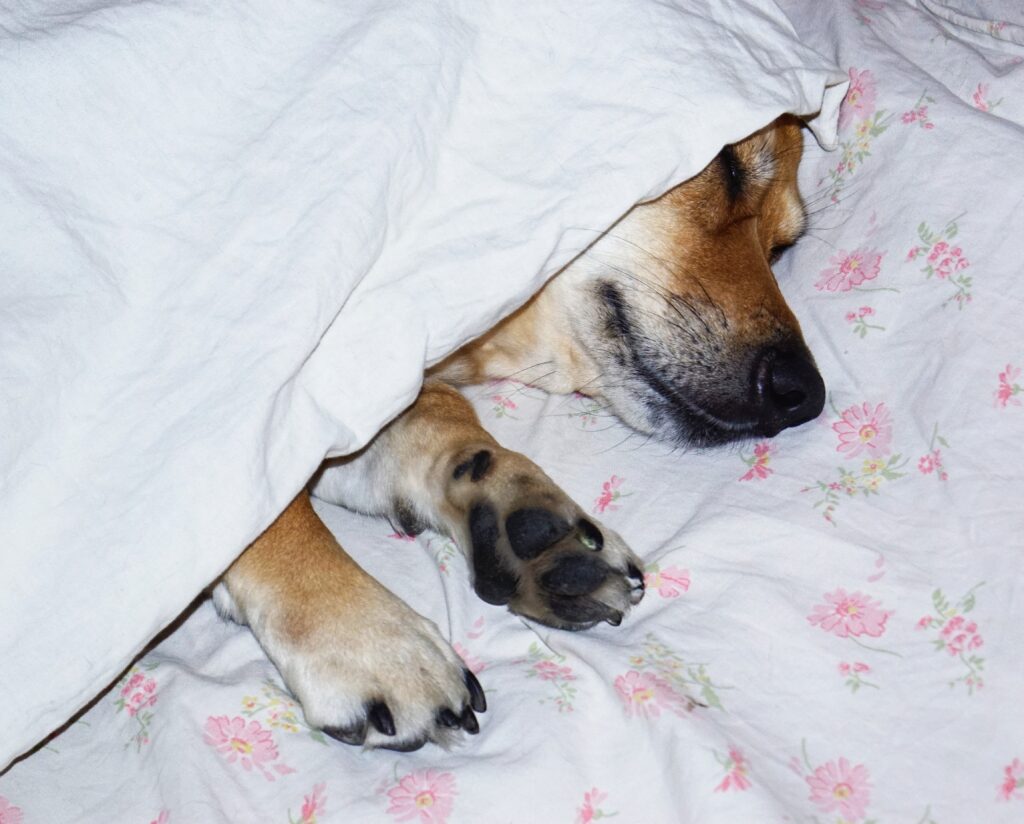
Additionally, age-related cognitive changes can result in confusion or forgetfulness, causing the dog to forget their housetraining.
Regular veterinary check-ups and appropriate management strategies can help address the effects of old age and manage the urination issue effectively.
Urinary Tract or Kidney Problems
Urinary tract or kidney problems can be a potential cause for an old dog suddenly peeing on the bed.
Conditions such as urinary tract infections, bladder stones, kidney disease, or urinary incontinence can lead to increased urgency or frequency of urination, resulting in accidents on the bed.
These issues can cause discomfort, irritation, or an inability to properly control the bladder.
Consulting a veterinarian is important to diagnose and treat any underlying urinary tract or kidney problems and to implement appropriate management strategies to address the sudden urination behavior on the bed.
Housetraining Issues
Housetraining issues can be a potential cause for an old dog suddenly peeing on the bed. Even if a dog has been previously housetrained, factors such as changes in routine, age-related cognitive decline, or underlying medical conditions can lead to accidents.
The dog may no longer recognize the bed as an inappropriate place to eliminate or may struggle to control their bladder.
Revisiting basic housetraining techniques, providing consistent bathroom opportunities, and addressing any medical or cognitive issues can help resolve the sudden urination problem on the bed.
Consulting a veterinarian or professional dog trainer may be beneficial in these cases.
Excitement, Fear, Stress, or Anxiety
Excitement, fear, stress, or anxiety can be a possible cause for an old dog suddenly peeing on the bed. Dogs may exhibit submissive or anxious urination in response to certain situations or emotions.
Exciting events, loud noises, unfamiliar visitors, or changes in the environment can trigger the dog’s anxiety or stress, leading to urination.
It is important to create a calm and reassuring environment for the dog, provide positive reinforcement for desired behavior, and consider consulting with a professional dog trainer or behaviorist to address the underlying emotional triggers and help manage the urination issue.
Territorial Marking
Territorial marking is unlikely to be the primary cause of an old dog suddenly peeing on the bed. Territorial marking is a behavior where dogs intentionally urinate to mark their territory and assert dominance.
However, if an old dog is suddenly urinating on the bed, it is more likely to be due to medical issues, housetraining problems, age-related factors, urinary tract infections, or anxiety/stress.
It is important to consult with a veterinarian to determine the underlying cause and appropriate treatment for the sudden change in urination behavior
Stress
Stress can be a potential cause for an old dog suddenly peeing on the bed. Dogs may exhibit stress-induced urination as a response to various triggers, such as changes in the environment, separation anxiety, the presence of new pets or people, or other stressful situations.
Stress can affect a dog’s bladder control and lead to accidents, including on the bed.
Creating a calm and secure environment, providing comfort and reassurance, and potentially implementing behavior modification techniques or seeking guidance from a professional can help alleviate the stress and reduce the urination issue.
Marking
Marking is a behavior where dogs intentionally urinate to mark their territory. While marking is more commonly associated with intact males, it can also occur in spayed or neutered dogs of any gender.
However, if an old dog is suddenly peeing on the bed, marking is less likely to be the primary cause. It is more likely to be due to medical issues, housetraining problems, age-related factors, urinary tract infections, or anxiety/stress.
Consulting with a veterinarian can help determine the underlying cause and appropriate treatment for the sudden change in urination behavior.
No Access to Outdoors
If an old dog is suddenly peeing on the bed, one possible cause could be the lack of access to outdoors. Dogs naturally have a strong instinct to eliminate outside, and if they are unable to go outside when they need to, they may resort to urinating indoors.
This can happen if there are changes in their routine, limited mobility, or difficulty reaching the outdoors due to physical barriers.
Ensuring that your dog has regular and convenient opportunities to go outside can help address this issue and prevent accidents on the bed.
Drinking Too Much Water
If an old dog is suddenly peeing on the bed, one possible cause could be drinking too much water. Increased water intake, also known as polydipsia, can lead to more frequent urination.
There are several reasons why a dog may drink excessive amounts of water, including medical conditions like diabetes, kidney disease, or Cushing’s disease.
It is essential to consult with a veterinarian to determine the underlying cause of increased water consumption and implement appropriate treatment.
By addressing the root cause, you can help regulate your dog’s water intake and reduce the likelihood of accidents on the bed.
Excitement
Excitement can be a possible cause for an old dog suddenly peeing on the bed. Some dogs, especially those with lower bladder control or anxiety, may experience excitement-induced urination when they become overly excited or stimulated.
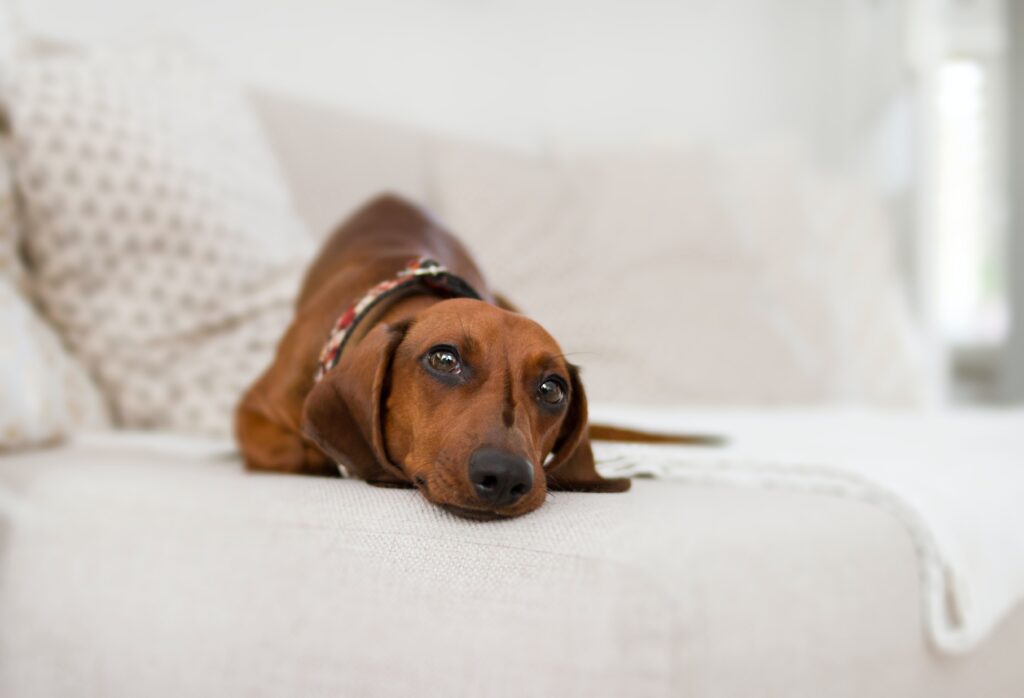
This can happen during greetings, playtime, or other exciting events. The dog’s bladder may not be able to hold the urine when they become excited, leading to accidents on the bed.
Providing a calm and controlled environment, managing excitement levels, and gradually acclimating the dog to exciting situations can help prevent this issue.
Improper House Training
Improper house training can be a potential cause for an old dog suddenly peeing on the bed. If a dog was not adequately trained to eliminate in appropriate areas or if there have been lapses in consistent reinforcement of housetraining, accidents can occur.
The dog may not understand that the bed is an inappropriate place to urinate or may have forgotten their previous training.
Revisiting basic housetraining techniques, providing consistent bathroom opportunities, and reinforcing positive behaviors can help address the issue and establish proper elimination habits.
Professional guidance may be beneficial in cases of persistent or challenging behavior.
Medical Conditions
Medical conditions can be a potential cause for an old dog suddenly peeing on the bed. Various medical issues, such as urinary tract infections, bladder stones, diabetes, kidney disease, or hormonal imbalances, can lead to increased urination or loss of bladder control.
These conditions can cause discomfort, inflammation, or impaired urinary function, resulting in accidents on the bed.
It is crucial to consult with a veterinarian for a thorough examination, diagnostic tests, and appropriate treatment to address the specific medical condition and manage the urination issue effectively.
Medical reasons for a dog peeing in your bed
There can be various medical reasons why a dog may start peeing in your bed. It’s essential to consult with a veterinarian to determine the underlying cause. Here are some potential medical explanations:
- Urinary Tract Infection (UTI): UTIs can lead to increased urgency and frequency of urination, causing accidents in inappropriate places like your bed.
- Bladder Stones: The presence of bladder stones can cause discomfort and irritation, leading to changes in urination patterns, including urinating on the bed.
- Incontinence: Older dogs or those with weakened bladder muscles may suffer from urinary incontinence, which can result in involuntary urination, even while sleeping on your bed.
- Diabetes: Dogs with diabetes may experience increased thirst and excessive urination. If they are unable to hold their urine, accidents on the bed can occur.
- Kidney Disease: Dogs with kidney problems may have difficulty concentrating their urine, leading to increased urination and accidents in various areas, including your bed.
- Cushing’s Disease: This condition involves an overproduction of cortisol, which can affect bladder control and cause increased urination.
- Behavioral issues: While medical reasons are common causes, it’s important to rule out any underlying health problems. However, in some cases, behavioral issues like anxiety, stress, or territorial marking can also lead to urinating on the bed.
Remember, only a veterinarian can accurately diagnose the cause of your dog’s behavior.
It’s crucial to provide them with detailed information and seek their guidance for appropriate diagnosis and treatment options.
Dogs peeing for psychological reasons
Dogs may exhibit urination behavior for psychological or behavioral reasons. Here are five psychological reasons why a dog might pee in inappropriate places:
1. Anxiety or Fear:
Dogs that experience anxiety or fear may urinate as a response to stressful situations or when they feel threatened. This can happen if they associate your bed with a place of safety or comfort.
2. Submissive Urination:
Some dogs have a tendency to urinate as a submissive gesture, particularly when they encounter dominant individuals or when they feel intimidated. This behavior is more common in puppies but can persist in some adult dogs.
3. Marking Territory:
Dogs have a natural instinct to mark their territory by urinating on objects or areas. If your dog perceives your bed as part of their territory, they may urinate on it to assert their dominance or communicate their presence.
4. Separation Anxiety:
Dogs with separation anxiety may feel distressed when left alone, leading to urination accidents as a result of the anxiety they experience.

The scent of your bed, which carries your scent, may provide them with some comfort during your absence.
5. Lack of Housetraining or Training Regression:
In some cases, a dog may not have been properly housetrained or may experience a regression in their training. This can lead to accidents, including urinating on the bed.
It’s important to note that diagnosing the specific psychological reasons behind a dog’s behavior can be challenging, and it’s advisable to consult with a professional dog behaviorist or trainer for a thorough assessment and tailored guidance to address the issue effectively.
What to do if your Dog is Peeing on the Bed
If your dog is peeing on the bed, it can be frustrating and unpleasant. However, it’s important to approach the situation with patience and understanding. Here are some steps you can take to address the issue:
- Rule out medical issues: Schedule a visit to the veterinarian to ensure that there are no underlying health problems causing your dog to urinate on the bed. Certain medical conditions like urinary tract infections or bladder issues can lead to inappropriate urination.
- Establish a routine: Dogs thrive on consistency, so establish a regular schedule for feeding, walking, and bathroom breaks. Make sure your dog has ample opportunities to relieve themselves outside, especially before bedtime.
- Reinforce proper bathroom behavior: When you catch your dog urinating on the bed, interrupt them with a firm “no” or clap your hands to startle them. Then, immediately take them outside to their designated bathroom area. When they finish urinating outside, praise and reward them with treats or affection. Positive reinforcement can help reinforce the desired behavior.
- Clean and deodorize the affected area: It’s crucial to thoroughly clean any urine stains to remove the scent that may attract your dog back to the bed. Use an enzyme-based cleaner specifically designed for pet urine to break down the odor-causing components.
- Limit access to the bed: Consider restricting your dog’s access to the bedroom or using a crate or baby gate to prevent them from entering the area with the bed. This will help break the habit and give you time to address the issue.
- Provide an alternative sleeping area: Offer your dog a comfortable and designated sleeping area of their own. Provide a cozy dog bed or crate in a location where they feel secure and comfortable. Make this area appealing with their favorite toys and blankets.
- Consult a professional: If the issue persists or worsens, it may be beneficial to seek guidance from a professional dog trainer or animal behaviorist. They can assess the situation and provide personalized advice and training techniques to address the specific problem.
Remember, consistency, positive reinforcement, and patience are key when dealing with inappropriate urination. With time and proper training, you can help your dog overcome this behavior and establish proper bathroom habits.
How to Stop Your Dog From Peeing on the Bed
To stop your dog from peeing on the bed, you can follow these steps:
1. Determine the cause:
Identify the reasons behind your dog’s behavior. It could be due to medical issues, anxiety, marking territory, or insufficient house training. Understanding the cause will help you address it effectively.
2. Visit the veterinarian:
Schedule a check-up for your dog to rule out any underlying medical conditions that could be causing the inappropriate urination. The vet can also provide guidance specific to your dog’s needs.
3. Establish a bathroom routine:
Create a consistent schedule for bathroom breaks. Take your dog outside frequently, especially after meals, naps, and playtime. Reward them with praise or treats when they pee in the appropriate spot.
4. Supervise and confine:
Keep a close eye on your dog, especially when they’re near the bed. Use baby gates or close the bedroom door to prevent access when you can’t supervise them directly. This helps break the habit of peeing on the bed.
5. Reinforce positive behavior:
When your dog eliminates in the desired location, offer praise, treats, or a favorite toy as a reward. Positive reinforcement encourages them to continue using the appropriate area.
6. Clean thoroughly:
Eliminate any lingering odor from previous accidents by cleaning the affected area with an enzyme-based cleaner designed for pet urine. Removing the scent helps deter your dog from repeating the behavior.
7. Make the bed unappealing:
Dogs are less likely to urinate on surfaces that are unpleasant or unfamiliar to them. Use deterrents like aluminum foil, double-sided tape, or a pet-safe repellent on the bed to discourage them from approaching or marking it.
8. Provide an alternative sleeping area:
Give your dog a comfortable and designated space to sleep, such as a cozy dog bed or crate. Make it inviting with their favorite toys, blankets, and a familiar scent. Gradually transition them to sleeping in their own space.
9. Address anxiety or stress:
If your dog’s urination issue is related to anxiety or stress, consult with a professional trainer or behaviorist. They can provide guidance on behavior modification techniques, desensitization exercises, or potential medication options.
Prevention of Peeing on the Bed
To prevent your dog from peeing on the bed, you can take the following preventive measures:
- Proper house training: Ensure that your dog is effectively house trained. Establish a consistent routine for bathroom breaks, and provide ample opportunities for them to relieve themselves outside. Reward and praise your dog for using the appropriate bathroom spot.
- Supervision and confinement: Keep a close eye on your dog, especially when they are near the bed. Supervision allows you to intervene if you notice any signs that your dog is about to urinate on the bed. If you cannot supervise, confine your dog to a safe area using baby gates or by closing the bedroom door.
- Limit access to the bed: Prevent your dog from accessing the bed when you are not present. Close the bedroom door or use a crate or dog gate to restrict their access. This reduces the likelihood of accidents and helps break the habit.
- Designate a comfortable sleeping area: Provide your dog with a cozy and comfortable bed or crate of their own. Make sure it is located in a place where they feel secure and can easily access it. Adding familiar items such as their toys or blankets can make the area more appealing.
- Positive reinforcement: Reward and praise your dog for appropriate behavior. When they choose to sleep in their designated area rather than the bed, offer treats, verbal praise, or petting. Positive reinforcement helps reinforce the desired behavior and encourages your dog to continue using their own sleeping space.
- Maintain a clean environment: Regularly clean your dog’s bedding and the surrounding area to remove any odors that may attract them to urinate. Use pet-friendly cleaning products to eliminate odors and stains effectively.
- Address anxiety or stress: If your dog’s bed-peeing behavior is triggered by anxiety or stress, identify and address the underlying causes. Consult with a professional trainer or behaviorist who can help you develop strategies to alleviate anxiety and create a more relaxed environment for your dog.
- Provide regular exercise and mental stimulation: Ensure that your dog receives enough physical exercise and mental stimulation throughout the day. Engage in activities such as walks, play sessions, and interactive toys. Adequate exercise can help reduce anxiety and prevent boredom-related behaviors.
Remember, prevention is key when it comes to unwanted behaviors. By implementing these preventive measures and consistently reinforcing positive behavior, you can significantly reduce the chances of your dog peeing on the bed.
Cost of Peeing on the Bed
The cost of a dog peeing on the bed can vary depending on several factors. Here are some potential costs to consider:
- Cleaning and replacement: If your dog pees on the bed, you’ll need to clean the affected bedding thoroughly to remove any urine stains and odor. This may involve purchasing specialized cleaning products or hiring professional cleaning services. In some cases, if the bedding is heavily soiled or damaged, you may need to replace it altogether, which incurs additional costs.
- Veterinary expenses: If the bed-peeing behavior is due to a medical issue, such as a urinary tract infection or bladder problem, you may need to visit a veterinarian for diagnosis and treatment. Veterinary expenses can include consultation fees, diagnostic tests, medications, and follow-up visits.
- Behavior modification: If the bed-peeing behavior persists despite addressing any underlying medical issues, you may need to seek professional help from a dog trainer or behaviorist. They can provide guidance and training techniques to modify your dog’s behavior. The cost of hiring a professional trainer or behaviorist will vary depending on their experience and location.
- Replacement items: If your dog continues to pee on the bed and doesn’t respond to training or behavior modification efforts, you may need to invest in alternative sleeping options, such as a new dog bed or crate. These costs can vary depending on the size and quality of the items you choose.
- Potential damage to furniture: In some cases, dogs may not limit their urination to just the bed but may also target other furniture in the house. If this happens, there may be additional costs associated with cleaning or repairing the affected furniture.
It’s important to address the bed-peeing behavior promptly to minimize any potential costs and prevent further incidents. Proper training, veterinary care, and maintaining a clean environment can help mitigate the financial impact of this behavior.
Related faq’s



